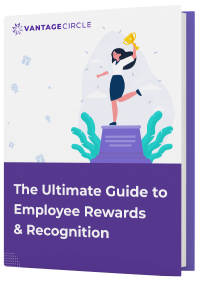Top 9 Non-monetary Incentives To Motivate And Retain Your Employees

What kind of incentive program do you think of when rewarding employees? Gift cards? Cash incentives? Bonuses?
But employees, nowadays, look for more personalized, non-monetary incentives from the organizations they work for. Gone are those days when monetary rewards were the only acceptable option to retain and motivate your employees.
According to a study by the Incentive Research Federation for the Incentive Marketing Association.
65% of employees prefer non-monetary incentives instead of monetary rewards.
Financial rewards and motivation can help attract talent to your organization. This type of motivation is also called Extrinsic motivation. But non-monetary compensation helps retain employees in the long run.
There are multiple kinds of non-cash rewards that might work for you and your employees.
But, before that, it is essential to know about these incentives’ benefits. And why you should opt for these instead.
What are the benefits of non-monetary incentives?
Various research shows that employees show greater enthusiasm and appreciation towards non-monetary incentives. A lunch with a manager, a trip to a hill station, or an extra day off is much more impactful than an extra amount of money. They won’t even remember what they spent it on.
These incentives leave a better and greater impression on employees and make employees feel more recognized and engaged.
Besides, several cognitive psychology principles suggest that people perceive non-monetary incentives to be more valuable than the retail value of that award in cash.
So, let us look at some of the benefits of non-monetary incentives in detail.
1. Non-monetary incentives have separability.
Unlike cash incentive, these incentives are given in small experiences or mental accounts, which is added to the employees’ total compensation.
Hence, it stands out and is easy to separate. It adds more value for the employees rather than a cash amount, which they won’t even remember what they spent it on.
2. The fringe benefits attract Gen-Z and millennials employees.
New graduates or freshers are especially attracted to the fringe benefits that companies offer. It helps in retaining the youngest professionals at your company.
An extra day off, employee perks, wellness initiatives are fringe benefits that help attract and retain the gen-z and millennial employees.
3. Non-cash rewards are more memorable and have an emotional value.
An invested employee will always find a non-cash reward more memorable and emotionally valuable.
Recognition at the workplace or getting an award is more memorable and pleasurable than receiving an extra cash amount. Moreover, when employees receive an award that they can keep and show or a trip they enjoyed, it adds more emotional value to the reward.
4. Non-cash incentives are more acknowledgeable and comfortable to talk about.
Your employees want to talk about the rewards or incentives they receive for their success and hard work.
Most of your employees might be more excited and comfortable talking about the lunch they went to with their manager, their trip, or the workshop they attended, rather than any cash prize.
Now that you know all about the benefits of non-monetary incentives, you need to figure out which incentives work best for your employees and your company.
To make your job easier, here is a list of a few of the top non-monetary incentives. These can help promote your long-term employee engagement goals and retain top talents at your company.
The top 9 non-monetary incentives for employees that actually work.
1. Flexibility at work.
Flexibility at work indicates the ability to decide when and where employees work. It can be a tremendous non-monetary reward. Offer your employees telecommuting options, such as granting them the opportunity to work from home once a week or setting their working hours at work.
Offering flexibility can help employees maintain a good work-life balance. An employee would love to work according to their schedules. It will result further in employee loyalty and engagement, increased organizational commitment, and higher job satisfaction.
2. Rewards and Recognition.
Having effective rewards and recognition program for your employees can be a great means for an incentive. Recognition of employees who have been working hard can mean a lot to them.
A good rewards and recognition program includes personalized or creative approaches. It can consist of sending a thank you email or a handwritten note, rewarding employees with gift cards, praising and mentioning their success at a meeting or in front of your colleagues, or recognizing them on social media.
3. Provide an extra day off.
Who doesn’t love an extra day off apart from the weekends?
Everybody loves some extra time off from work to maintain an excellent work-life balance. That is why granting a day off outside of annual leave is a perfect employee incentive.
Getting a day-off as a reward will make employees feel recognized for all the hard work and motivated to work harder.
4. Provide time for volunteer work.
Offer employees some time out of work to volunteer for anything that they would want to.
Working at the same place with the same people every day might feel mundane and too self-serving. Allowing going out and serving the community can boost employee morale.
Moreover, it adheres well to the company image too. So, it’s a win-win situation for both employees and the company.
5. Provide extensive training plans.
Employees often find ways to take courses and training in their area of work to improve themselves at work or for personal development. But, it often happens that they might not get access to such training or workshops.
Providing training plans or making accredited courses or workshops accessible can be a huge help to your employees. It can improve their skills and make them feel like you care about their personal growth.
6. One-on-one lunch.
Sometimes, you need to go beyond giving public accolades and just sending a thank you email to your employees to appreciate their success and hard work.
What’s better than to bond over food with employees who appreciate one-on-one’s personal gratitude expressions. Spend some quality time with employees during a quality lunch.
It’s a great opportunity to get feedback from your employees and address your employees’ issues. You can also show your gratitude towards their hard work.
7. Experiential Rewards
Experiential rewards are becoming popular among managers and employees.
An experiential reward is an event or experience that an employee earns. Be it a trip to a hill station, a day at the spa, a pass to a match, or anything your employees might like.
92% of employees surveyed said their motivation to perform increased after receiving a Blueboard experience.
An experiential reward is a better way to recognize and reward employees. Employees will consider these rewards more thoughtful instead of a cash prize for their success and hard work.
Choose experiential rewards based on the personal interests of your employees.
8. Offer to mentor an employee.
One great personal reward would be to offer your guidance and mentorship to your employees.
The best employees would always be willing to learn more from the company’s leaders and get great empowerment and experience for them.
Help your employees by sharing your experience and tips and tricks to use at work and be successful.
9. Let employees have more autonomy at work.
Your employees love their independence.
Giving employees the autonomy to perform a task on their own without someone else or you micromanaging them would be a great opportunity for your employees.
Offer your employees leadership opportunities, too, for better use of autonomy at work.
Now, we know all about the different kinds of non-monetary incentives that you can offer your employees. So, make sure to give these a go.
The Bottomline
There’s no limit to incentives for your employees. You can shape and figure out an incentive program of high quality and fit your company's goals and employees best.
Apart from focusing on only the rewards, try to create an environment where hard work and success are recognized and rewarded regularly at the workplace.

Vantage Circle is a simple AI-powered Rewards & Recognition Platform for upgrading your employee experience and engagement for better productivity.






